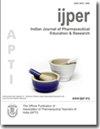Evaluation of Anti-Depressant Activity of spirulina, a blue-green algae on Chronic Unpredictable Stress Induced Depression in Rats
IF 0.8
4区 医学
Q3 EDUCATION, SCIENTIFIC DISCIPLINES
Indian Journal of Pharmaceutical Education and Research
Pub Date : 2023-10-04
DOI:10.5530/ijper.57.4.113
引用次数: 0
Abstract
Abstract: Background: Depression is a crippling and pervasive illness that can affect a person in many different ways. It can be identified by certain symptoms, such as modifications in behaviour, psychological functioning, and brain physiology. Materials and Methods: One of the animal models for depression has been the Chronic Unpredictable Mild Stress (CUMS) paradigm. In this study, spirulina algae, which contains tryptophan, was chosen and tested for its anti-depressant effectiveness in the CUS model using Fluoxetine as the gold standard. Wistar rats were chosen to undergo the CUS process for 28 days, and throughout that time, the test drug was given at doses of 400 mg/kg. Results: Behavioural and biochemical parameters were analysed, and has shown significant changes. Conclusion: When compared to the CUS group, spirulina algae at the tested doses had a substantial impact on behavioural and metabolic testing. These findings demonstrated that Spirulina algae specifically exhibited an in vivo anti-depressant-like effect. Keywords: Antidepressant, Spirulina algae, Force swim test, Tail suspensstion test, Sucrose preference test, Chronic Unpredictable Stress.蓝藻螺旋藻对大鼠慢性应激性抑郁的抗抑郁活性评价
摘要:背景:抑郁症是一种严重的、普遍存在的疾病,它可以通过许多不同的方式影响一个人。它可以通过某些症状来识别,例如行为、心理功能和脑生理学的改变。材料和方法:慢性不可预测轻度应激(CUMS)模式是抑郁症的动物模型之一。本研究选取含有色氨酸的螺旋藻,以氟西汀为金标准,在CUS模型中检测其抗抑郁效果。选择Wistar大鼠进行28天的CUS过程,在此期间,给药剂量为400 mg/kg。结果:行为和生化参数分析,并显示出显著的变化。结论:与CUS组相比,试验剂量的螺旋藻对行为和代谢测试有实质性影响。这些发现表明,螺旋藻在体内具有特异性的抗抑郁作用。关键词:抗抑郁药,螺旋藻,力游试验,悬尾试验,蔗糖偏好试验,慢性不可预知应激
本文章由计算机程序翻译,如有差异,请以英文原文为准。
求助全文
约1分钟内获得全文
求助全文
来源期刊
CiteScore
1.40
自引率
0.00%
发文量
227
审稿时长
>12 weeks
期刊介绍:
The official journal of Association of Pharmaceutical Teachers of India (APTI) and is being published since 1967. IJPER, a quarterly publication devoted to publish reviews and research articles in pharmacy and the related disciplines of Pharmaceutical education. It mainly covers the articles of special interest, covering the areas of Pharmaceutical research, teaching and learning, laboratory innovations, education technology, curriculum design, examination reforms, training and other related issues. It encourages debates and discussions on the issues of vital importance to Pharmaceutical education and research. The goal of the journal is to provide the quality publications and publish most important research and review articles in the field of drug development and pharmaceutical education. It is circulated and referred by more than 6000 teachers, 40,000 students and over 1000 professionals working in Pharmaceutical industries, Regulatory departments, hospitals etc.

 求助内容:
求助内容: 应助结果提醒方式:
应助结果提醒方式:


